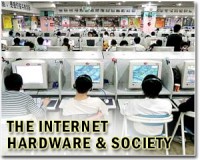 |
Belfast, UK (SPX) Nov 03, 2010 Members of the public could form the backbone of powerful new mobile internet networks by carrying wearable sensors. According to researchers from Queen's University Belfast, the novel sensors could create new ultra high bandwidth mobile internet infrastructures and reduce the density of mobile phone base stations. The engineers from Queen's renowned Institute of Electronics, Communications and Information Technology (ECIT), are working on a new project based on the rapidly developing science of body centric communications. Social benefits from the work could include vast improvements in mobile gaming and remote healthcare, along with new precision monitoring of athletes and real-time tactical training in team sports. The researchers at ECIT are investigating how small sensors carried by members of the public, in items such as next generation smartphones, could communicate with each other to create potentially vast body-to-body networks (BBNs). The new sensors would interact to transmit data, providing 'anytime, anywhere' mobile network connectivity. Dr Simon Cotton, from ECIT's wireless communications research group said: "In the past few years a significant amount of research has been undertaken into antennas and systems designed to share information across the surface of the human body. Until now, however, little work has been done to address the next major challenge which is one of the last frontiers in wireless communication - how that information can be transferred efficiently to an off-body location. "The availability of body-to-body networks could bring great social benefits, including significant healthcare improvements through the use of bodyworn sensors for the widespread, routine monitoring and treatment of illness away from medical centres. This could greatly reduce the current strain on health budgets and help make the Government's vision of healthcare at home for the elderly a reality. "If the idea takes off, BBNs could also lead to a reduction in the number of base stations needed to service mobile phone users, particularly in areas of high population density. This could help to alleviate public perceptions of adverse health associated with current networks and be more environmentally friendly due to the much lower power levels required for operation." Dr Cotton has been awarded a prestigious joint five-year Research Fellowship by the Royal Academy of Engineering and the Engineering and Physical Research Council (EPSRC) to examine how the new technology can be harnessed to become part of everyday life. He added: "Our work at Queen's involves collaborating with national and international academic, industrial and institutional experts to develop a range of models for wireless channels required for body centric communications. These will provide a basis for the development of the antennas, wireless devices and networking standards required to make BBNs a reality. "Success in this field will not only bring major social benefits it could also bring significant commercial rewards for those involved. Even though the market for wearable wireless sensors is still in its infancy, it is expected to grow to more than 400 million devices annually by 2014." Further information on the work of ECIT's Wireless Communications Research Group can be found online at www.ee.qub.ac.uk/wireless/
Share This Article With Planet Earth
Related Links Queen's University Belfast Satellite-based Internet technologies
 Wikimedia sees boost for languages online with India office
Wikimedia sees boost for languages online with India officeMumbai (AFP) Nov 1, 2010 The creation of Wikimedia's first overseas office outside the United States could lead to the increased use of Indian languages online, the company's co-founder said on Sunday. Jimmy Wales said Wikimedia, a non-profit organisation which owns the user-generated encyclopedia Wikipedia, is currently looking for a location in India for its operation and could start within six months. He told ... read more |
|
| The content herein, unless otherwise known to be public domain, are Copyright 1995-2010 - SpaceDaily. AFP and UPI Wire Stories are copyright Agence France-Presse and United Press International. ESA Portal Reports are copyright European Space Agency. All NASA sourced material is public domain. Additional copyrights may apply in whole or part to other bona fide parties. Advertising does not imply endorsement,agreement or approval of any opinions, statements or information provided by SpaceDaily on any Web page published or hosted by SpaceDaily. Privacy Statement |